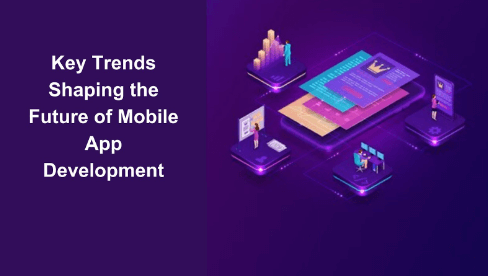Key Trends Shaping the Future of Mobile App Development

The mobile app development world is in a constant state of flux, with new technologies and user expectations reshaping the way we think about apps. The strategic move to hire mobile app developers is becoming more intertwined with the latest technological advancements and trends in mobile app development. These trends are not just fleeting changes; they represent significant shifts in how we interact with technology, shaping the future of the mobile app industry.
Before you make a hiring choice, understanding the key trends driving change in this space is crucial. In this detailed guide let’s explore the key trends, each unfolding the potential to revolutionize mobile app development.
Embracing Innovation: The Future-Defining Trends in Mobile App Development
The landscape of mobile app development is a kaleidoscope of innovation, where new trends emerge, shaping the way we interact with technology. This deep dive into the top trends in mobile app development is a roadmap for those seeking to hire mobile app developers, highlighting the innovations that are defining the future of mobile apps.
1. Increased Focus on AI and Machine Learning
Artificial Intelligence (AI) and Machine Learning (ML) are redefining mobile app development, offering unprecedented personalization and efficiency. AI-driven features like chatbots, predictive analytics, and personalized content are becoming commonplace, elevating user engagement to new heights. Machine Learning algorithms analyze user data to continuously refine and improve the app experience, catering to individual preferences and behaviors.
The impact of AI and ML in mobile apps extends beyond user experience. They’re transforming how developers approach app functionality, enabling the creation of more intelligent and responsive apps. From AI-based language processing to advanced image recognition, these technologies are opening new possibilities for app functionalities with a streamlined development process.
2. The Rise of Augmented Reality (AR) and Virtual Reality (VR)
Augmented Reality (AR) and Virtual Reality (VR) are reshaping the landscape of mobile app development. These technologies offer immersive experiences that have transformed gaming, education, retail, and more. AR adds digital elements to a live view, often using the camera on a smartphone, while VR implies a complete immersion experience that shuts out the physical world.
For instance, in retail, AR apps allow customers to visualize products in their environment before purchasing. Education apps use AR and VR to create interactive learning experiences, making complex concepts easier to understand. These technologies provide a fully immersive experience for gaming, significantly enhancing user engagement.
The future of AR and VR in mobile apps looks promising. With the advancement of ARKit and ARCore, developers now have more tools at their disposal to create innovative AR experiences. Meanwhile, the increasing accessibility of VR headsets is opening new possibilities for VR in mobile apps.
3. Emphasis on Mobile App Security
With the growing reliance on mobile apps for everyday activities, security has become a paramount concern. Mobile app developers are focusing more on incorporating advanced security measures to protect sensitive user data. This includes end-to-end encryption, secure data storage, and secure coding practices to safeguard against vulnerabilities.
The rise of mobile commerce and online transactions has further accentuated the need for robust security protocols. Developers are implementing features like biometric authentication, two-factor authentication, and secure payment gateways to ensure safe transactions.
Additionally, with the increasing threats of cyber attacks, developers are adopting a proactive approach to security. Regular security audits, vulnerability assessments, and keeping up with the latest security trends are becoming standard practices in mobile app development.
Read also: Mobile Monitoring: The Benefits of Employee Tracking Apps
4. Growth of Cross-Platform Development
Cross-platform development is gaining momentum as businesses seek to expand their reach across multiple platforms without incurring excessive development costs. Tools like React Native and Flutter allow developers to write code once and deploy it across iOS, Android, and web platforms, significantly reducing development time and effort.
This trend is driven by the need for efficiency and agile time-to-market. Cross-platform tools provide a consistent look and feel across different platforms, ensuring a uniform brand experience for users.
However, cross-platform development also poses challenges. Maintaining performance and ensuring that the app leverages the unique features of each platform can be complex. Therefore, when you hire mobile app developers they must carefully plan and execute to ensure that the app delivers a seamless experience on each device.
5. Integration of Internet of Things (IoT) in Mobile Apps
The integration of the Internet of Things (IoT) into mobile app development is a trend that’s rapidly gaining traction. IoT technology enables mobile apps to communicate with connected devices, offering innovative functionality and enhanced user experiences.
IoT-enabled mobile apps can control smart home devices, track health metrics through wearables, and even manage industrial equipment. This interconnectivity opens up new possibilities for app functionalities, making everyday tasks more convenient and efficient.
For developers, the challenge lies in ensuring seamless communication between the app and IoT devices. This includes addressing issues related to connectivity, compatibility, and security. As more devices become connected, ensuring the security of user data becomes even more critical.
Let’s not miss out on the proliferation of 5G technology as well as the emergence of blockchain technology. These trends also have immense potential in shaping the future of the mobile app development realm.
Concluding Speech
These diverse yet interconnected trends are shaping the future of mobile app development. From the advancements in AI and 5G technology to the innovative applications of AR/VR and blockchain, each trend offers unique opportunities and challenges.
For businesses looking to hire mobile app developers, understanding these trends is crucial for creating applications that not only leverage the latest technologies but also meet the evolving needs of users in this dynamic digital market space.




